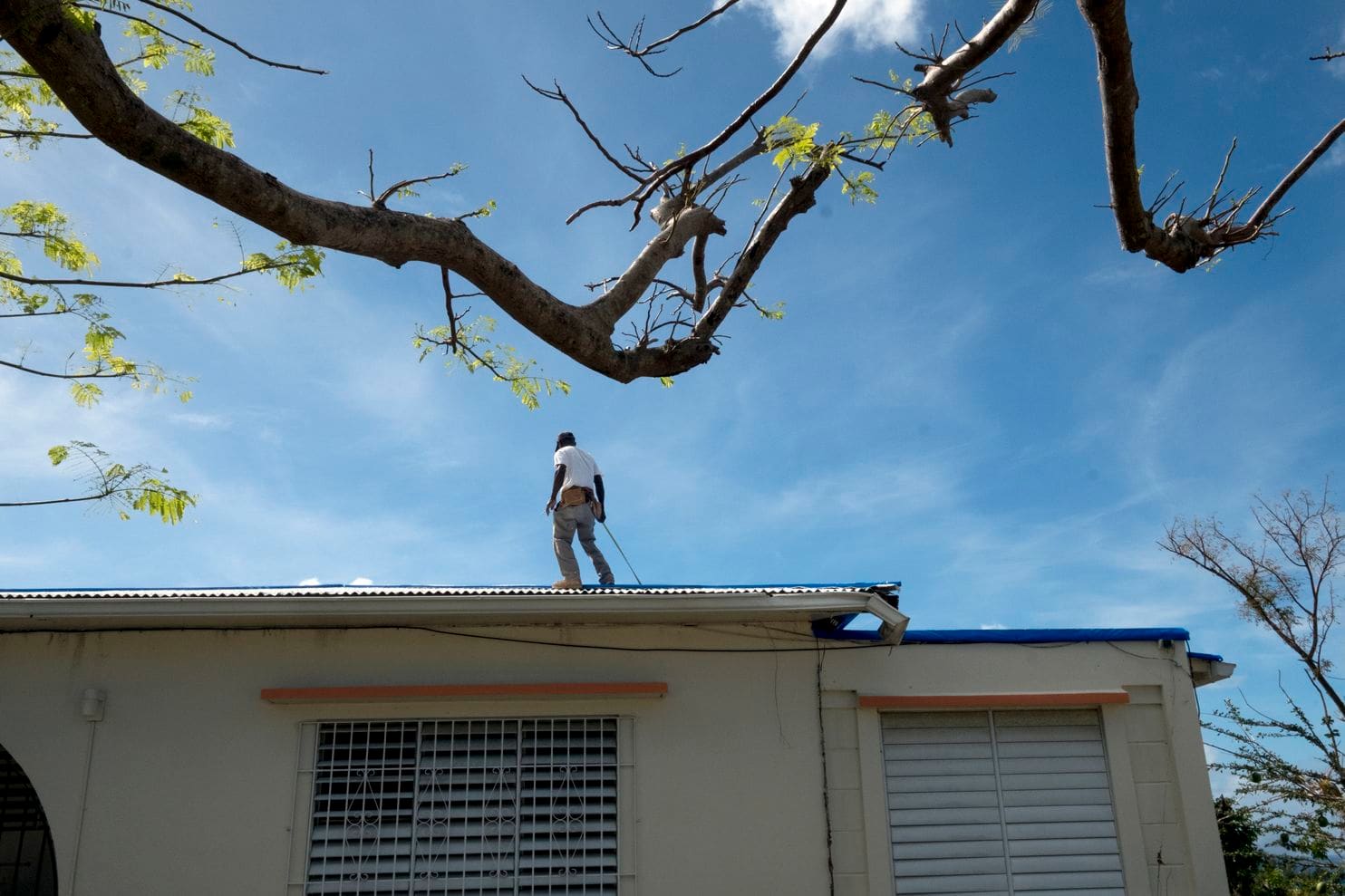By TIM CRAIG
CHARLOTTE AMALIE — A major government program to rebuild the U.S. Virgin Islands after back-to-back hurricanes is unraveling as some contractors walk off the job and others threaten to use storm victims’ properties as leverage to recoup unpaid bills.
In a letter outlining their grievances over chronically late payments, three large contractors also called on the federal government “to freeze all advances of disaster recovery funds to the USVI until the past due invoices are paid.”
The dispute over the Sheltering and Temporary Essential Program (STEP), a joint effort by the territorial government and the Federal Emergency Management Agency to repair about 8,000 houses, has been dragging on for months but is now veering into a nasty legal showdown over who is responsible for paying the bills.
The subcontractors who are doing much of the cleanup work say the project’s chief contractor owes them tens of millions of dollars. That contractor, AECOM, says it can’t pay the bills until the Virgin Islands government pays it for past-due invoices. The territory says it is waiting for FEMA to approve the spending.
The STEP program is a centerpiece of FEMA’s $8 billion effort to help the Virgin Islands rebuild after the territory was devastated by hurricanes Irma and Maria in the fall of 2017. The program is designed to allow people to remain in their homes while work crews repair damage.
AECOM, a global development firm that reported more than $20 billion in revenue last year, is implementing the program for the island. In the joint letter — sent to representatives for AECOM, the Virgin Islands Housing and Finance Agency and Witt O’Brien’s, a private disaster response agency that is managing the territory’s recovery effort — the subcontractors said they and other firms are collectively owed more than $60 million for work already performed, puttingsome of those firms at risk of insolvency or bankruptcy.
The three subcontractors — Polaris Engineering, Lamar Contractors and SLSCO — threatened to file liens on properties in the Virgin Islands where they’ve done work that has not been paid for. That would create even more uncertainty for thousands of hurricane victims on St. Thomas, St. Croix and St. Johns, the three islands that make up the territory.
The subcontractors said they “need to protect their legal rights to ensure that federal disaster recovery funds are not used to pay for something other than their intended purposes.”
“We have no choice but to act to secure our legal rights,” the subcontractors stated in the letter, which set a Friday deadline for coming up with “written plan of action to pay the past due invoices.”
The letter said some of the subcontractors’ unpaid invoices are nearly a year old.
Chivonne A.S. Thomas, the president of the Virgin Islands Bar Association, said the threat to file liens on property owners could present “very large implications” for homeowners.
Under territorial law, subcontractors can file “a lien to secure payment of the contract price” during a dispute over work performed on a property. Thomas said such a lien would prevent the property owner from selling or using it as equity.
But Thomas said that while she isn’t sure the liens would stand up in court, territorial law appears to make an exception for projects being done for the Virgin Islands government.
Typically, state and territorial governments pay the upfront costs associated with STEP and similar assistance programs, and FEMA reimburses them. But even before the hurricanes, the Virgin Islands was saddled with debt and running low on cash.
Michael Chee, a spokesman for AECOM, said checks to subcontractors are lagging because the company has “tens of millions of dollars” in outstanding invoices that first need to be paid by the territory or FEMA.
“We are still working diligently to make sure work continues to help the islands get back to normal as soon as possible,” Chee said. “Obviously, any funds that we receive will go out to the respective contractors as quickly as possible.”
Richard Motta, a spokesman for Virgin Islands Gov. Albert Bryan (D), said the territory is trying to work with federal officials so disaster funds are released as “expeditiously as possible.” Motta declined to comment further, saying the government does “not comment on potential legal matters.”
In recent testimony before the territorial legislature, Daryl Griffith, the director of the Housing and Finance Authority, noted that the Virgin Islands had already paid AECOM $136 million. But he added that the program involves “many layers of reviews and approvals before funds are released.”
Home repairs performed by contractors, for example, must pass inspectionbefore the territory can draw funds from FEMA to pay for the work, he noted.
“A worksite is active until all work completion is signed off by the resident, contractor, subcontractor and VI Housing Finance Authority after the final site visit,” said FEMA spokeswoman Abbey Dennis, who added that the agency views the dispute as a local matter between the territory and contractors.
Frustration among workers, meanwhile, has been mounting.
Subcontractor Rob Ord said he is owed more than $3 million for his services providing security to job sites through his company, Falken Industries USVI, and said some subcontractors have also been walking off the job.
Carlos Bega, another subcontractor, said he worked as a roofer on St. Thomas for two months and has yet to be paid.
Bega, 51, says he is owed about $20,000.
“Everyone out here is not being paid,” said Bega, who lives in Puerto Rico but traveled to the Virgin Islands to repair homes under the STEP program. “You got people out here without food to eat, but everyone is trying to help each other out.”
–THE WASHINGTON POST


Don’t expect some of these contractors and sub-contractors to come back after the next hurricane.